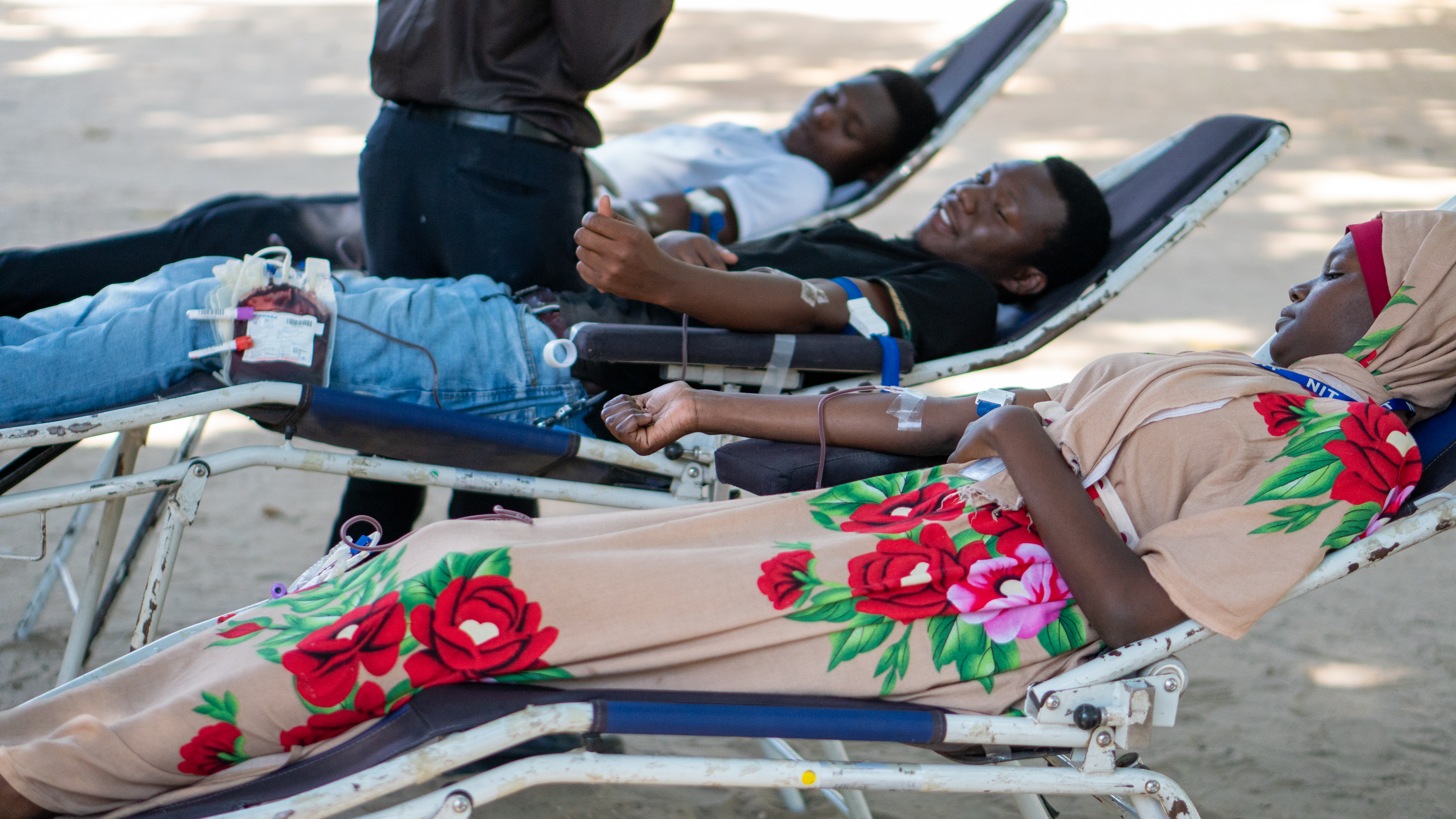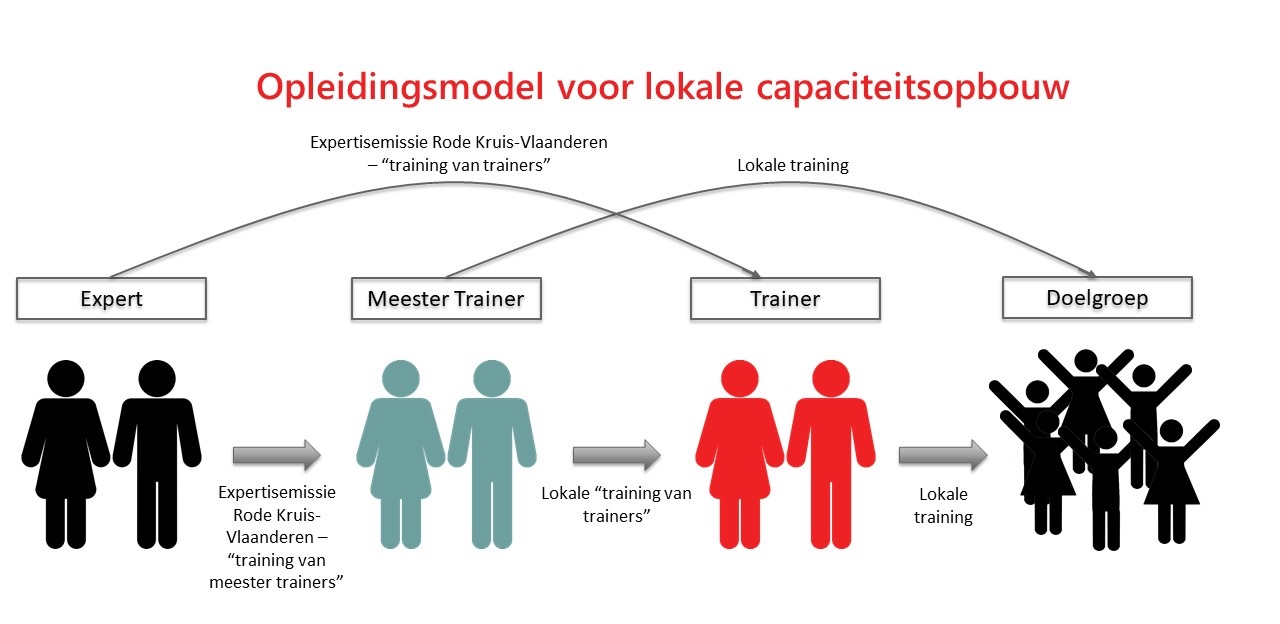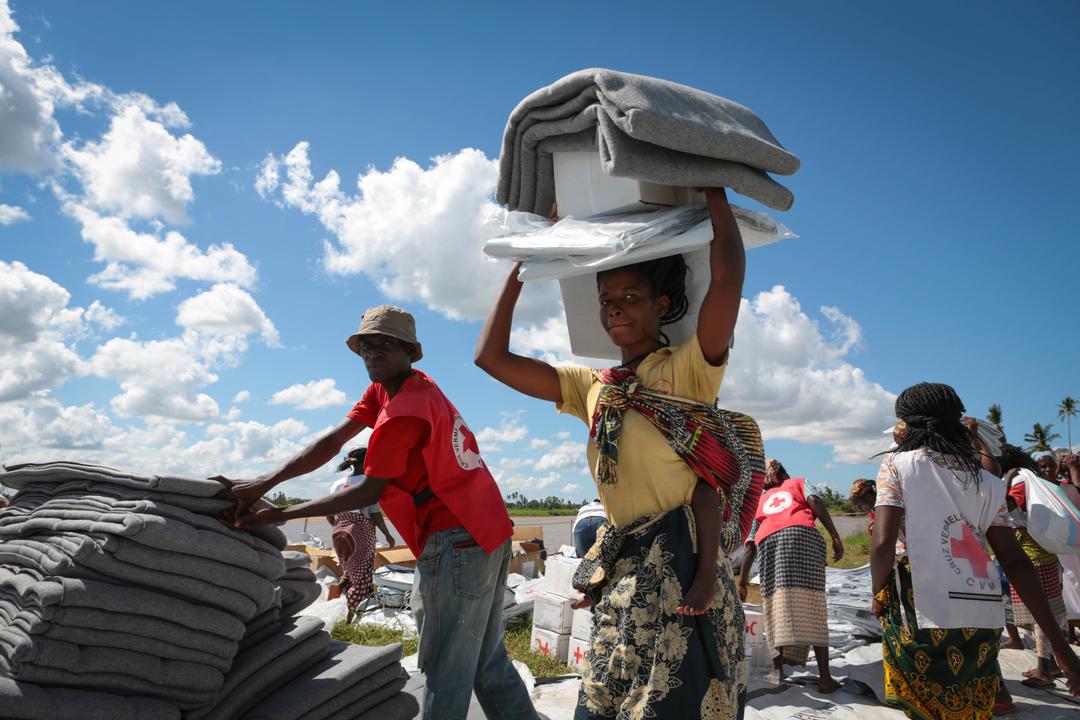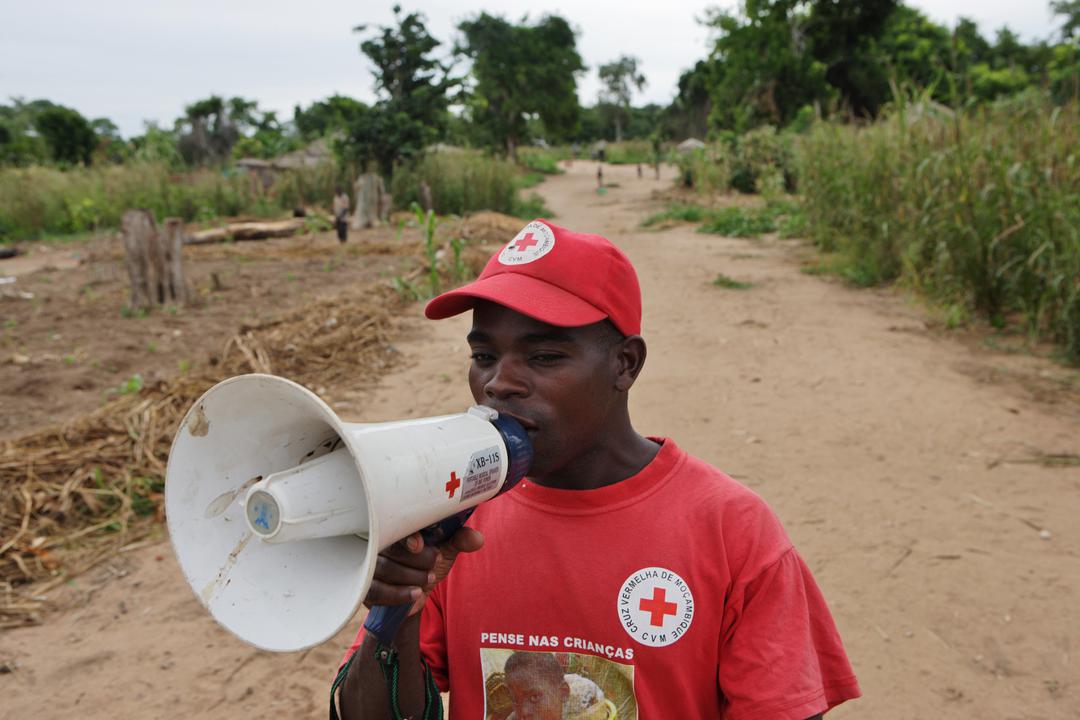Sharing of expertise
Belgian Red Cross-Flanders supports its sister Red Cross and Red Crescent societies by sharing expertise in blood, first aid and disaster preparedness.
Sharing expertise in blood
Sufficient and safe blood is essential to guarantee a strong healthcare system. In Flanders, we are the largest supplier of blood products to hospitals and therefore we are an excellent partner to share our knowledge in the international context. We work with our sister Red Cross and Red Crescent societies and with blood institutions worldwide to increase the availability of safe donor blood.
Recruiting voluntary blood donors
An important task for many Red Cross and Red Crescent societies is to motivate and attract (new) donors. In doing so, it is important to give blood on a voluntary and unpaid basis. Indeed, as Belgian Red Cross-Flanders , we believe that only voluntary, unpaid blood donations provide sufficient safe blood, something that is not self-evident in every country. This view is based on scientific findings, which show that paid blood donations increase the risk of transfusion-transmitted diseases.
Based on our expertise in Flanders, we developed an international training to teach the basic principles of recruiting voluntary blood donors. During this training, national Red Cross societies learn why blood is necessary, what the benefits of voluntary and unpaid blood donation are, and what techniques can be used to efficiently reach and retain blood donors. This training is given by experienced staff or volunteers from Belgian Red Cross-Flanders to staff of local Red Cross societies, so that they can then use the materials themselves to further train their volunteers and staff.
The content of this training has been adapted to the context of our partner countries. Under the guidance of experts from Sub-Saharan Africa and using scientific data, an evidence-based manual "Blood Donor Recruitment in Africa" has been developed.

Quality improvement of blood supply
Finding volunteer blood donors, however, is just the beginning. Before blood reaches a patient, a whole process must be gone through to ensure that safe and effective blood is administered. For example, the blood is tested for infectious diseases, stored at the correct temperature and sometimes divided into different components: red blood cells, plasma and platelets. Thanks to our extensive experience in Flanders, we support blood services worldwide in this too, and together we make processes efficient and qualitative. Based on an extensive context analysis, we can, for example, advise on the purchase of new equipment, organize training or design new processes.
Sharing expertise in first aid
First aid saves lives! Educating people properly enables them to administer life-saving, initial care. As Belgian Red Cross-Flanders, we are a global reference point on first aid guidelines. We are therefore happy to share this knowledge within the Red Cross movement, universities and international partners. For example, we directly support National Red Cross Societies from other countries in building first aid expertise and activities.
First aid adapted to the context
Under our guidance, African experts compile the necessary guidelines and teaching materials in their first aid training and activities in Africa. The"Basic First Aid in Africa" manual and"First Aid for First Responders in Africa" nicely demonstrate the strength of these collaborations. The guidelines are adapted to the African context, scientifically based and pay attention to local customs. For example, we recommend using materials that are easy to find locally, such as honey as an alternative to a burn ointment. We also develop specific manuals for different target groups, such as the"Youth First Aid" for children between the ages of 12-16 and the"First Aid for Road Traffic Injuries" for people who are on the road a lot, such as cab and bus drivers, police officers, and others who can help with road accidents. Especially in rural areas, where there are few health professionals and the health infrastructure is very limited, first aid knowledge among local people is essential if they are to be able to help each other in an emergency.
An app to share first aid
To make first aid training more sustainable, Belgian Red Cross-Flanders developed an innovative and scalable first aid training app on cell phone for national Red Cross societies in Sub-Saharan Africa: the First Aid Blended Learning app. The courses offered combine e-learning through the smartphone app with a practical one-day classroom training. Because the classroom portion of the training is thus shortened, the training can be offered at a much lower cost and trainers can efficiently train a larger number of future first responders.
In addition, the app also includes a module that assists users in the event of an emergency. By entering a few key words (e.g., "choking"), the app will quickly provide the appropriate instructions to provide assistance.
Training local trainers
In addition to developing contextualized first aid manuals and materials, we also train local trainers who in turn transfer first aid knowledge to local people. That first step is called a "Training of Trainers," where experienced volunteers from Belgian Red Cross-Flanders share their content and didactic knowledge with future local trainers.
Local trainers can also become "Master Trainers," by attending a "Training of Master Trainers. After this, they can also conduct a 'Training of Trainers' themselves. The figure below shows the training model used by Belgian Red Cross-Flanders to do local capacity building.

Sharing expertise in disaster preparedness
National Red Cross and Red Crescent Societies are on standby worldwide to provide disaster relief to the population. These can range from natural disasters, such as floods, to man-made disasters, such as armed conflict. Ensuring an efficient response to unexpected disasters requires the necessary expertise and preparation. Belgian Red Cross-Flanders assists its sister Red Cross and Red Crescent societies in these preparations, both at institutional and local level.
Insitutional disaster preparedness
To respond on a large scale to humanitarian needs in a country, it is important that each national Red Cross and Red Crescent Society knows how to respond quickly and efficiently in the event of a disaster. Through the global network, Red Cross and Red Crescent Societies help each other and expertise and operational knowledge is exchanged between them.
These include training intervention teams, building and managing warehouses of emergency relief supplies, developing structures and procedures to ensure rapid communication and decision-making, and so on.

Disaster preparedness within local communities
Disaster preparedness is also being worked on at the local community level so that people themselves are able to take action. This can be done both by trying to prevent as many disasters as possible, by limiting their impact or by already taking actions themselves in anticipation of assistance on a larger scale. This includes setting up local disaster committees in disaster-prone areas. In these, experts from their region map the greatest risks in their communities and draw up feasible contingency plans. Based on this, preventive measures can be taken. These include installing early warning systems ("early warning systems"), detecting epidimics, organizing evacuation drills or building hurricane-resistant houses.
In addition, local disaster response teams are being trained so they can immediately spring into action after a disaster by setting up searches, clearing debris and administering first aid to the injured.

How can you help?
Become a volunteer
- Do you have experience teaching first aid courses?
- Do you speak English and/or French fluently?
- Are you willing to master our African first aid materials and/or materials around blood donor recruitment?
- Would you like to train volunteers from our African Sister Societies in First Aid or Blood Donor Recruitment?
Then apply to become expert mission volunteer First Aid or Blood using the contact form below!
If this is not what you are looking for, but would still like to help and think you have some expertise that could be useful, be sure to write to us as well.
Ask us your question about sharing expertise or sign up to volunteer
Evaluations & management responses
Our operation is funded in part by project funding. The reports of the mid-term and final evaluations of our five-year program on Water, Sanitation & Hygiene (WASH) and First Aid, Action Plan 17-21, can be accessed below.
Making people self-reliant is the way par excellence to have a sustainable impact. Both Belgian Red Cross-Flanders's intervention strategy and the choice of activities in the current 2017-2021 Action Plan are based on the idea of self-reliance.
Although Belgian Red Cross-Flanders 's projects do not focus on education, the presence of learning forms - and moments - is very important in our projects. Therefore, from our vision of Evidence Based Practice, we are taking a closer look at this part of our projects to generate more impact in the long run.
- Water, Sanitation & Hygiene (WASH): in hygiene promotion you try to change a community's behavior around water use by, among other things, increasing community knowledge. This knowledge transfer takes place in different ways such as during a community meeting or individual visits to households. Both ways require a different educational approach.
- First Aid: the main pillar in our programs is to build and support quality first aid training. To this end, among other things, we provide evidence-based training materials and train master trainers and trainers. Both within the training of (master) trainers and in training the final target group, a good didactic approach and the collection of feedback (with the aim of continuous adjustment and improvement) plays a major role.
Funded by the Belgian Development Cooperation, both a mid-term and a final evaluation were conducted aimed at assessing these learning moments and learning forms in our WASH and First Aid projects.
Mid-term evaluation
The interim evaluation was conducted by "The Learning Hub" between November 2019 and May 2020, with the goal of:
- Increase the impact of the learning components (training, knowledge transfer, communication around behavior change) in our programs.
- Exploring digitization as a tool to make our trainings more impactful and cost-effective.
The evaluation was conducted in Tanzania and Rwanda. Of course, the recommendations and lessons learned can also be translated to our other partner countries.
The evaluation found that Belgian Red Cross-Flanders already provides a very solid foundation for the learning components in ongoing programs and that some interesting, initial initiatives related to digitization have already been undertaken. The evaluation identified some lessons learned and made a series of recommendations to increase impact in a cost-effective and more digital way.
The final interim evaluation report and management response can be accessed here:
- Mid-term review (WASH) report (.pdf)
- Interim evaluation report (First Aid) (.pdf)
- Management response (.pdf)
Final evaluation
The final evaluation was conducted by "Key Aid Consulting" between January 2022 and May 2022. This evaluation aimed to assess all WASH and First Aid projects of the 2017-2021 Action Plan on the following criteria:
- Relevance: does the intervention do what it is supposed to do?
- Coherence: how well does the intervention fit?
- Effectiveness: does the intervention achieve its objectives?
- Efficiency: how well are resources used?
- Impact: what difference does the intervention make?
- Sustainability: will the benefits be lasting?
The evaluation was conducted in all the project countries within the 2017-2021 Action Plan, namely Nepal, Zimbabwe, Burundi, Mozambique, Rwanda, South Africa and Tanzania.
The 2017-2021 Action Plan appears to have achieved the intended results in the First Aid projects: lay people, staff and volunteers of the local Red Cross Societies have adequate, up-to-date and evidence-based knowledge and skills to provide first aid to people in need, thereby increasing community resilience and capacity for (emergency) assistance. The First Aid projects were particularly valuable given the limited coverage of health centers and services in the local regions.
The WASH projects also proved highly relevant, as access to safe water and sanitation were important needs in the affected communities. The construction of water points and improved latrines succeeded in meeting these needs in most countries. In certain other countries we did experience more challenges in this regard, mainly related to the purchase of construction materials, their timely delivery in the communities, delays caused by negotiations with local authorities, etc. The lack of sufficient experience of the local partner in the WASH sector and less qualified staff partly explain this difference between countries. The lessons learned and recommendations will undoubtedly be useful in future projects, including the new multi-year program 2022-2026.
The final evaluation reports and management responses to them can be accessed here:
- Burundi_FA_Management response_AP17-21
- Burundi_WASH_Management response_AP17-21
- FA & WASH End Evaluation report Nepal_AP17-21
- FA End Evaluation report Africa_AP17-21
- Mozambique_FA_Management response _AP17-21
- Mozambique_WASH_Management response_AP17-21
- Nepal_FA & WASH_Management response_AP17-21
- Rwanda_FA_Management response_AP17-21
- Rwanda_WASH_Management response_AP17-21
- South Africa_FA_Management response_AP17-21
- Tanzania_FA_Management response_AP17-21
- Tanzania_WASH_Management response_AP17-21
- WASH End Evaluation report Africa_AP17-21
- Zimbabwe_FA_Management response_AP17-21
